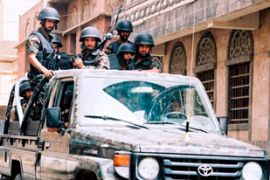Yemeni soldiers killed in fighting
Clashes continue in Saada despite president’s call to fighters to lay down arms.

Published On 18 Mar 2007
Leaflets dropped
“Leaflets have been dropped from the air asking people to hand in their arms and vowing they would not be detained,” the official said.
It was not immediately possible to get a comment from al-Huthi’s followers.
Abdul-Malik is a relative of Hussein Badr Eddin al-Huthi, a Zaidi Shia cleric killed in 2004 during a rebellion he led against the Yemeni government.
The uprising has continued despite Hussein al-Huthi’s death and clashes in the northern Yemeni province of Saada have left several hundred soldiers and rebels dead.
Al Jazeera reported quoting local sources in Saada that more than 120 people were killed or injured in the renewed clashes.
The sources said 13 soldiers and eight pro-government volunteers were among those killed in addition to three al-Huthi followers.
Talks rejected
Ali Abdullah Saleh, the Yemeni president, has rejected talks with the fighters and urged them to surrender to end the violence.
In March, the Yemeni security supreme committee announced the release of 627 followers of the cleric, following a pardon from Saleh.
Government officials say at least 275 fighters and 124 soldiers have been killed in clashes this year.
Al-Huthi’s followers say the official figures of fighters’ losses are inflated but give no numbers of their own.
Yemen has accused the rebels of wanting to install Shia religious rule and of preaching violence against the US.
Rebel supporters say the government is too closely allied with Washington and have accused the authorities of seeking to silence the cleric’s criticism of corruption.
Sunni Muslims make up most of Yemen’s 19 million-strong population, while Shia Muslims account for about 15 per cent.
Rebel supporters say the government is too closely allied with Washington and have accused the authorities of seeking to silence the cleric’s criticism of corruption.
Sunni Muslims make up most of Yemen’s 19 million-strong population, while Shia Muslims account for about 15 per cent.
Al-Qaeda trial
In a separate development, in Sanaa, the Yemeni capital, defence lawyers for 36 Yemenis charged with planning or carrying out acts of terror for al-Qaeda demanded access on Sunday to the accused’s files before the next trial hearing, scheduled for April.
The 17-lawyer defence team threatened to quit if denied access to the files, or consultations with the defendants, during Sunday’s second session of the trial that began on March 4 before a special terrorism tribunal.
The 36, reportedly members of the Yemeni branch of al-Qaeda, are accused of “forming an armed group with the aim of perpetrating criminal acts … by attacking foreign residents in Yemen, the clients of a hotel … and causing explosions targeting vital installations”.
Twin assaults
Four attackers driving car bombs and a guard were killed in the twin assaults which were later claimed by al-Qaeda in an internet statement posted last November.
Thirty defendants, who are also accused of attacking police officers, were in court on Sunday. They deny the accusations and say their confessions were extracted under torture.
Six more are on the run after escaping from a Sanaa prison more than a year ago and are being tried in absentia.
The fugitives were among 23 al-Qaeda suspects who tunnelled out of jail on February 3, 2006.
Source: News Agencies